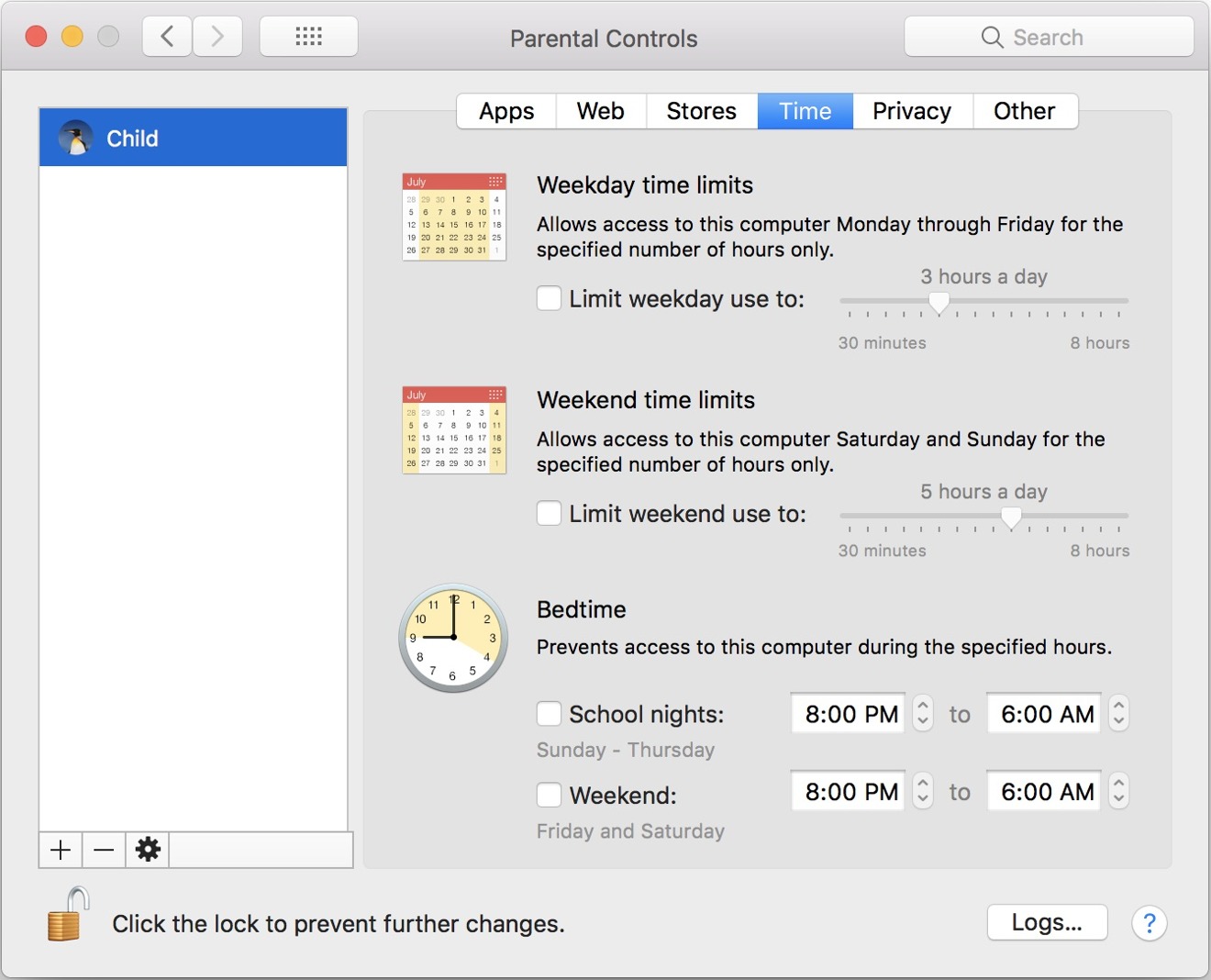Apple is vexed with the problem of excessive customer satisfaction, particularly in the troublesome demographic of young users. That's the latest hot take reaction to the issue of kids being given permissive parental approval to stay up all night on their iOS devices, leaving them sleep deprived and distracted. Apple's parental controls on iOS are focused on limiting access to content and specific apps, but the company already has tools in place to enforce parents' wishes on the Mac. It just needs to bring these to iOS.
The problem of children being distracted from sleep and a focus on school and growth certainly isn't new. For decades, kids have stayed up too late playing with toys, watching TV, playing video games or simply running around outside.
What is new is the technology to securely enforce how devices work. Apple has long provided parental controls in macOS, a form of the business-oriented policy management designed to prevent employees from using devices, apps or content outside of their corporate-approved permissions. Apple brought some of these controls to iOS under Restrictions Settings.
These settings enable parents to block access to specific apps and features, from the Wild West of the WWW in Safari to access of AirDrop file sharing, the Camera and Siri. Parents can also password protect access to iTunes, iBooks, News, Podcasts, and block the installation of new apps. There are also privacy settings parents can use to limit what apps can access their location, contacts, calendars, photos, microphone and so on.
Back to the Mac
What's still missing is time, date and bedtime hours restrictions that are available under Parental Controls on Macs. The controls on Apple's desktop platform also include limiting web browsing to specific sites, emailing to specific contacts, and can limit a child's account to using the "Simple Finder," which effectively restricts what a young user can do in various ways.
Apple issued a statement is response to concerns that young people were at risk of distraction and even suicide from excessive use of unrestricted technology, noting that it planned to bring additional controls to iOS.
The company stated that "effectively anything a child could download or access online can be easily blocked or restricted by a parent" already, while outlining "new features and enhancements planned for the future, to add functionality and make these [parental control] tools even more robust."
The nutty insanity of maliciously cynical Apple narratives
The histrionic attention to Apple's "addiction" problem has been blown into a full gale bomb cyclone of low-heat white flurries by the typical sources. Even MacWorld included a cliche subheading spectating that future updates "might be too little, too late!" despite not knowing anything about what they might include, ignorance expressed as criticism in describing Apple's comments as a "vague statement."
None of the common reports on the contrived AddictionGate story seemed to understand that parental controls already exist on the Mac, and none acknowledged that Google's Android, Amazon FireOS, or any other phone, tablet or game console platform (or television) might suffer from a similar inability to enforce the aims of parents who don't actually physically engage in the control of access to their children's devices.
Also not mentioned in any of the reports of the dire state of children possessing iPhones was acknowledgement of Google's harassing, abusive comments and sickeningly bizarre and violent YouTube content directed specifically at children and monetized by the company until an uproar ensued; nor FaceBook's wildly permissive data gathering on children in its Facebook and Messenger apps and its feed of content that regularly splashes suicide-inducing abuse and depraved, explicit content from virtually any source; nor the potential for children to stay up late using Amazon's Alexa to order age-inappropriate materials without parental guidance.
 Daniel Eran Dilger
Daniel Eran Dilger







-m.jpg)






 Wesley Hilliard
Wesley Hilliard
 Malcolm Owen
Malcolm Owen
 Andrew Orr
Andrew Orr
 William Gallagher
William Gallagher
 Sponsored Content
Sponsored Content
 Christine McKee
Christine McKee

 Thomas Sibilly
Thomas Sibilly






14 Comments
Perhaps this is something Apple can add in iOS 12. I doubt its gonna be anything added in iOS 11. It might be better if Apple could do some kind of iCloud based thing though so parents can modify settings without having the device in their hands.
In the end though...parents should be parents and if the child isn't doing what they're supposed to with it then maybe they don't deserve it. Having a mobile device is a privilege, not a right.
Maybe I couldn't talk with my friends over my Nintendo, or my PS1 but it still could be a distraction and keep me from doing my school work, studying for tests, etc. That was easily solved by taking it away. I guess thats too much for parents these days.
It does seem odd that only Apple is being targeted for parental controls on devices when there must be hundreds of companies that could be targeted for needing such controls. It would seem all gaming devices should have some sort of use-time controls built into them in order for parents to limit children's playing time. Apple has become a loser of a company to always allow itself to be attacked by the news media or some other entity while other companies are totally ignored. There must be billions of Android smartphones that don't have strong parental controls on them. Does a PS3 or PS4 have such parental controls? Of course, like any electric device, the power plug can simply be pulled and the device taken away.
This is definitely an issue that Apple is responsible for providing better tools for parents. They've created a powerful pocket size computer with access to the almost limitless resources in the internet and built-in gaming and social media to hook the users. It's much different then when prior generations had access to other physical devices/phones, because they were very simple and easy to control access/content. The current parental control tools do not exist, or provide easy configuration and monitoring without excess cost or time requirements, to allow for meaningful usage and access, yet restrict the content or consumption of the device. Additionally, to Apple's own assertion, these are highly personal devices that tend to make children have a sense of entitlement to the device. The argument of "just take it away" does more damage to the relationship and the sense of trust between the child/parent then it does to solve the actual issue, which is limiting access and consumption. I'm not saying Apple should be helping to monitor this, but at least provide the same tools they have currently for the Mac.
This is potentially a huge social issue as phone/technology addiction leads to lots of unsocial tendencies and behavioral problems, so for essentially the entire current youth generation to be caught up in this could have huge implications 20-30 years from now. I already see it in the workplace and the inability of lots of young 20 somethings to have face to face conversations without having to pick up their phone as a distraction from actual physical communication. It's sad and scary.
Really they need better parity between the MacOS and iOS parental controls.
This would be amazing on iOS.
iOS internet restrictions on the Mac would be miles ahead of MacOS.
Right now if you block all sites on iOS and only have a whitelist, you can still use Spotify or Dropbox apps without it requesting to allow IP addresses all the time. Right now on MacOS, if you whitelist, Spotify and Dropbox ping IPs ALL. THE. TIME. Super annoying to get the approval popup all the time.
Overall the both solutions are ok, but need improvement.
Unfortunately the problem of devices distracting kids is worse than the old problems of kids wanting to play outside, or with toys etc. In comparison to the TV its more tightly integrated, the interactivity keeps kids involved.
Kids still get hungry and thirsty when playing with toys or outside, while on the phone they can go hours without noticing. Playing outside is healthy, playing with others outside or on toys builds social interaction skills and makes friends.
Online apps try to tie the kids in (and do a good job of engaging them), and they change the challenges continually. Kids can hide their phones from parents and do things much less supervised.
I think they activate the same neurology engaged in gambling that leads to problems.
None of this is Apples fault or responsibility.
We monitor our kids closely but even with lots of effort it isn't enough. If Apple can help is that would be good.
The MacOS stuff is a start. Perhaps make a "parental friendly" rating that app developers can apply for that allows greater oversite - like parents authorising friends, or giving privacy to chats with specific real-life friends but sharing chats with parents for anyone met online (for 8 year olds, for example).